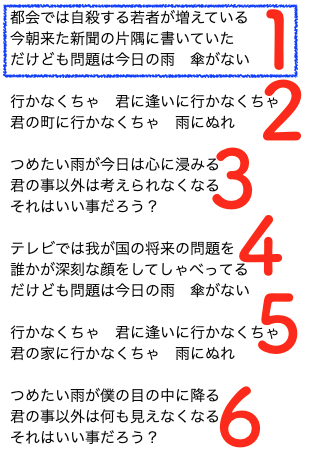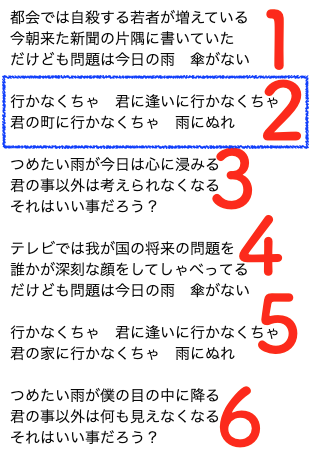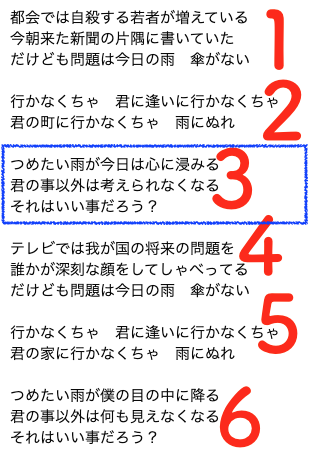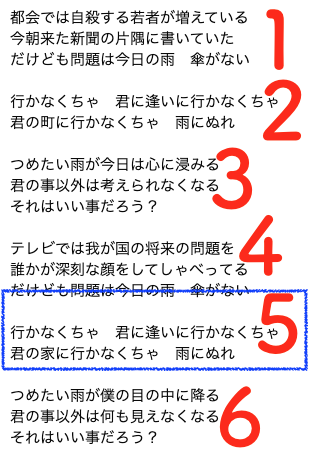Ode for Cambell's Translation of Yōsui Inoue
訳詞礼賛
Ode for Cambell's Translation of Yōsui Inoue
訳詞礼賛
Of the many excellences which I perceive in the order of our State, there is none which upon reflection pleases me better than the rule about poetry- Plato, Republic Book X.
「要するに、翻訳がひとつの独自な形式であるように、翻訳者の課題も独自の課題として把握され ねばならぬ——創作者の課題とは厳密に区別して」ヴァルター・ベンヤミン「翻訳者の課題」(岩波・野村修訳:82)。
井上陽水さんの詩「傘がない」のロバート・キャンベ ル先生(2019)による英訳をもとに解説します。
 |
1. No Umbrella "In the cities, youth suicides on the rise." It's written so in a corner of the morning paper. But hey, the problem is, you know, today's rain - there's no umbrella. +++++++++++ But hey, "Demo nē" in Japanese |
 |
2.I've
gotta go, gotta get out, out to see you over to your side of town drenched in the rain. ++++++++++ drenched, "Bishonure" in Japanese |
 |
33.Cold rain seeps into my
heart today I can't think of anything but you - isn't that how it should be? ++++++++++ seep, "Shintō-suru" in Japanese |
 |
44.On the telly "problems
facing our nation's future" - somebody's gabbing with a long face. But hey, the problem is, you know, today's rain - there's no umbrella. ++++++++++ telly means "television" gab means "give," then gabbing is also explained itself as anagram with a long face is not literally "long face as house face," but "with an unhappy or disappointed expression." |
 |
55.I've gotta go,
gotta get out, out to see you over to your house drenched in the rain. ++++++++++ Refrain of #2 drenched, "Bishonure" in Japanese |
 |
66. Cold rain is falling in my eyes. I can't see anything but you - isn't that how it should be? ++++++++++ In Japanese "Kemurigamenishimiru," you can traslate these phrases "Smoke gets in sight." Why did Cambell-san translate "Cold rain is falling in my eyes"as Rain gets in my sight ? Isn't that how it should be? |
About translator, "Robert Campbell, Ph.D., is a scholar of Japanese literature and the Director-General of the National Institute of Japanese Literature (NIJL), Tokyo. Born in New York City, he studied in the Departments of Economics and Oriental Languages, University of California, Berkeley (B.A. 1981), and the Department of East Asian Languages and Civilizations, Graduate School of Fine Arts, Harvard University (M.A. 1984; Ph.D. 1992). Campbell moved to Japan to study Edo literature as a research student in the Department of Japanese Language and Literature, Kyushu University, Fukuoka City (1985), joining that department as assistant professor (1987). He then moved on to the National Institute of Japanese Literature, Tokyo (associate professor, 1995), and relocated to the University of Tokyo in 2000, where he taught as professor from 2007. His tenure as Director-General of NIJL began in 2017. Robert Campbell's research centers on the sinological literature, art, media and intellectual discourses of late Edo and early Meiji period Japan. Besides editing and contributing to numerous volumes on Japanese literature, art and drama, he is active in the Japanese media as television host, news commentator, newspaper columnist, book reviewer and radio personality." - from "Cousera"
About the poet, "Yōsui Inoue (井上 陽水, Inoue Yōsui, born August 30, 1948) is a Japanese singer, lyricist, composer, guitarist and record producer, who is an important figure in Japanese music. He is renowned for his unique tone, eccentric lyrics, and dark sunglasses which he always wears.... (9971–1975; Polydor years) Inoue reached the pinnacle of his popularity as a musician in the mid-1970s. The breakthrough providing him with the nickname "Emperor of Japanese Folk-rock", and introduced his more early efforts to listeners (the songs including "Jinsei ga Nido Areba", "Ai wa Kimi", "Kasa ga Nai (No Umbrella)", "Tsumetai Heya no Sekai Chizu", "Yoru no Bus", "Natsu Matsuri", "Kannazuki ni Kakomarete", "Kami Hikouki", "Nokonoshima no Kataomoi" became popular particularly)." Yōsui Inoue.
Links
Bibliography
Other informations
